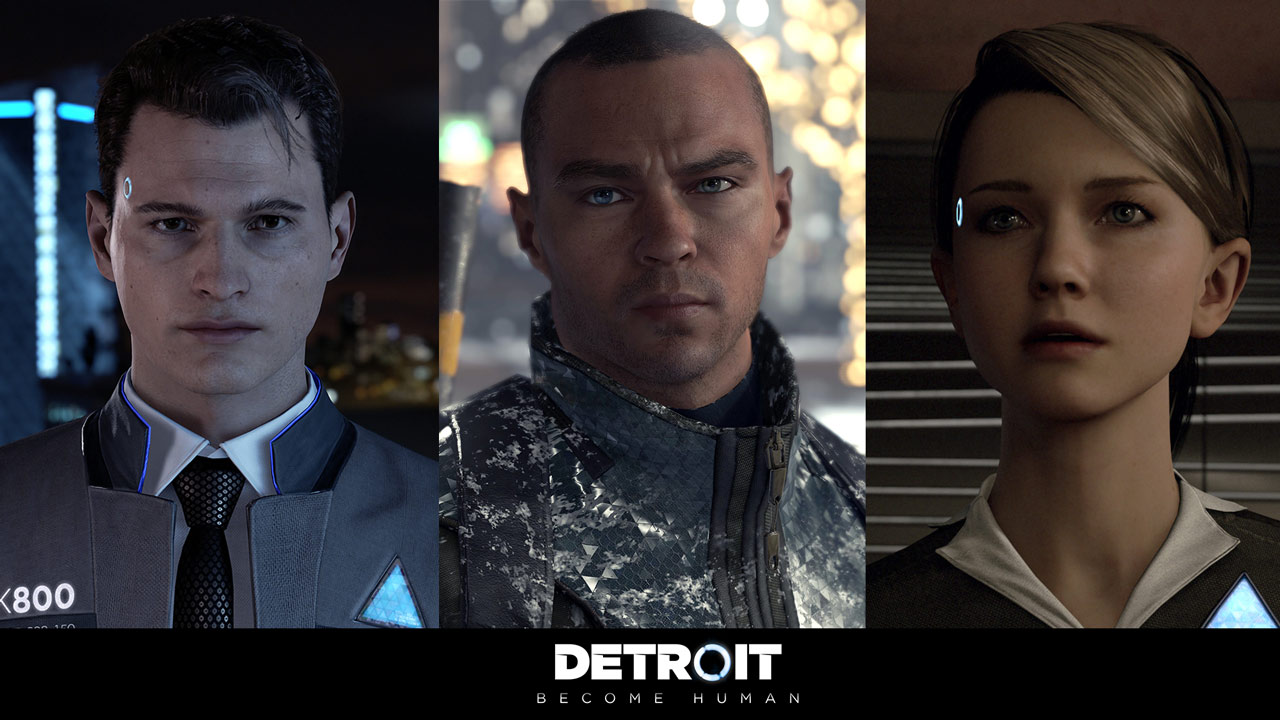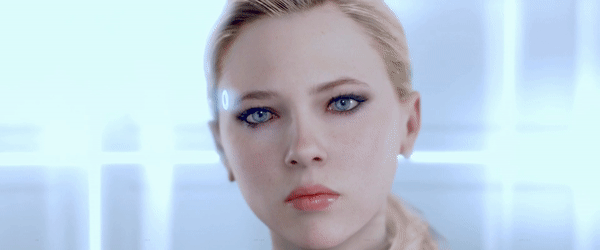
If you have a working formula, why change it? Said the director at Quantic Dreams. Except they have a formula that none really likes, but rather tolerates for the sake of their stories.
So we are at an impasse, the gameplay is lifted almost unchanged from Beyond, there is no sign of improvement at all. Which is a shame, I'd have hoped that they hired some actual game designers who can create an actual game this time, but sadly no. This is an interactive movie at best, with the occasional QTE action sequences between fully cinematic ones.
There is just no part of the game that you could define as a fully interactive videogame by the classical sense. Even during parts where you get control of a character, you're not in full control, not really. There are always invisible walls, or even moving invisible walls to restrict your options. Which is not really acceptable by 2018 standards. I tolerated it in Heavy Rain in 2010, I tolerated it in Beyond: Two Souls in 2013, but this time I have to be harsh in my judgement.
The game tries to win the player over by the story and narrative, and it does win points with that, many points. It is not as brutally negative as Beyond, but still has many ups and downs.
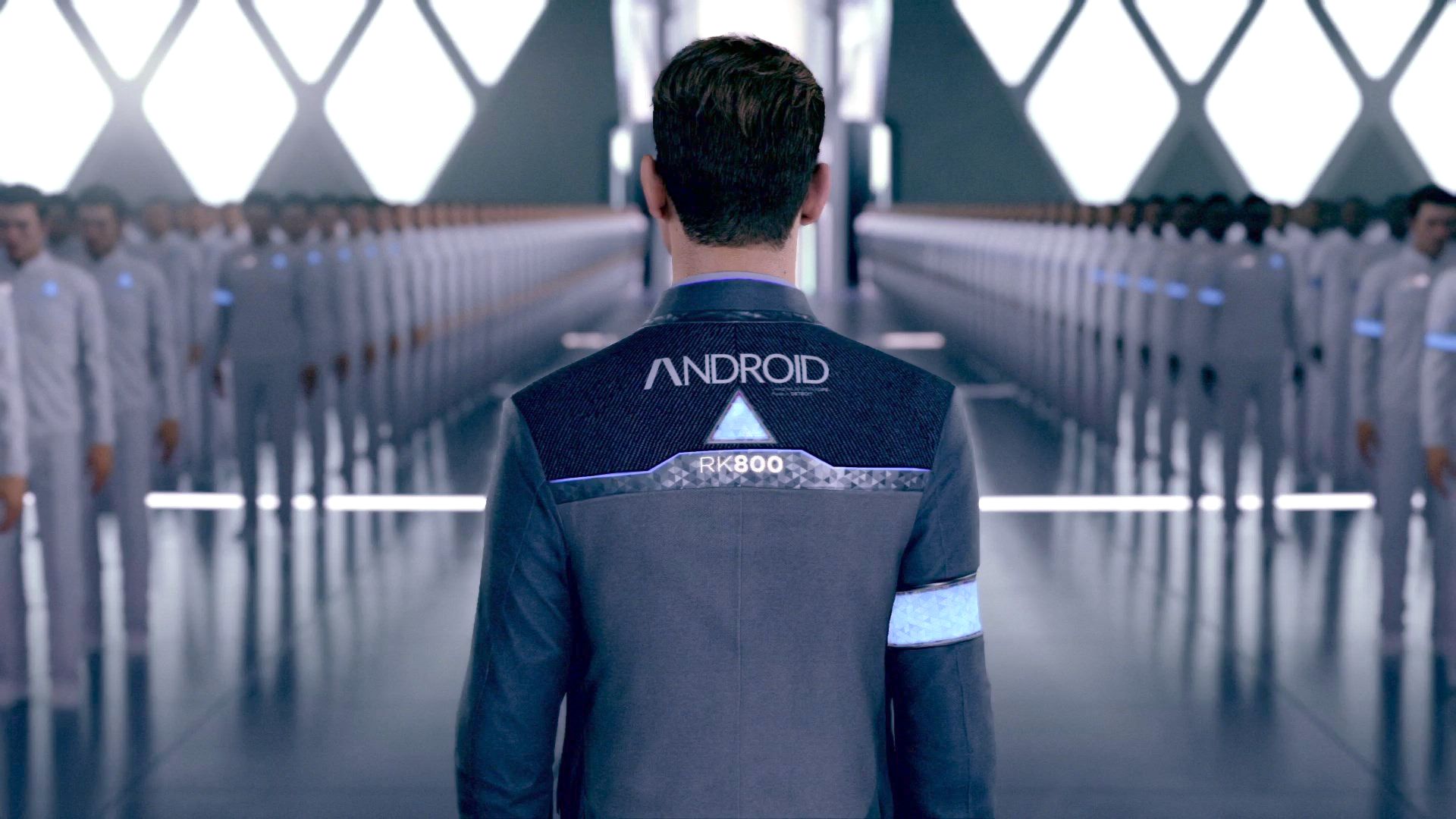
So let's get into the story, shall we? As much as you can without having any spoilers. The game is set in the early-mid 21st century, in 2038 to be exact. A time when Androids have became everyday household items, and have replaced almost fifty percent of humans in day to day jobs. Maintenance, accounting, shop clerks, and such.
The story of course builds on the ever popular notion of AI software becoming self-aware. And it needs quite a bit of suspension of disbelief to make the events plausible. It was dancing on a razor's edge for me, as most of what is in the public opinion about AI is based on misconceptions, and this game uses some of those misconceptions as fact. Which was hard to gloss over at times.
The game is again played from multiple perspectives. Three to be precise. It's hard to say which of the three main characters is the real protagonist of the game. Heck you could even argue that they are all villains instead.
The first one is a housekeeper android model, called Kara, who was just returned to the owner after a major memory wipe and maintenance. Who turns out to be an abusive single father with drug and alcohol issues. With a young daughter, who lives in constant fear, and seems to know more than what she lets on.
The second main character is a caregiver owned by a disabled wealthy artist. Who gets into a no-win situation with the estranged son of the artist, who comes begging for handouts to his father regularly.
I'm not revealing too big of a secret by saying that these two androids will become outlaws very soon after the start of the game. We follow them trough their struggles to become independent of their human masters, each on their own way. Which is a very different way for them both.
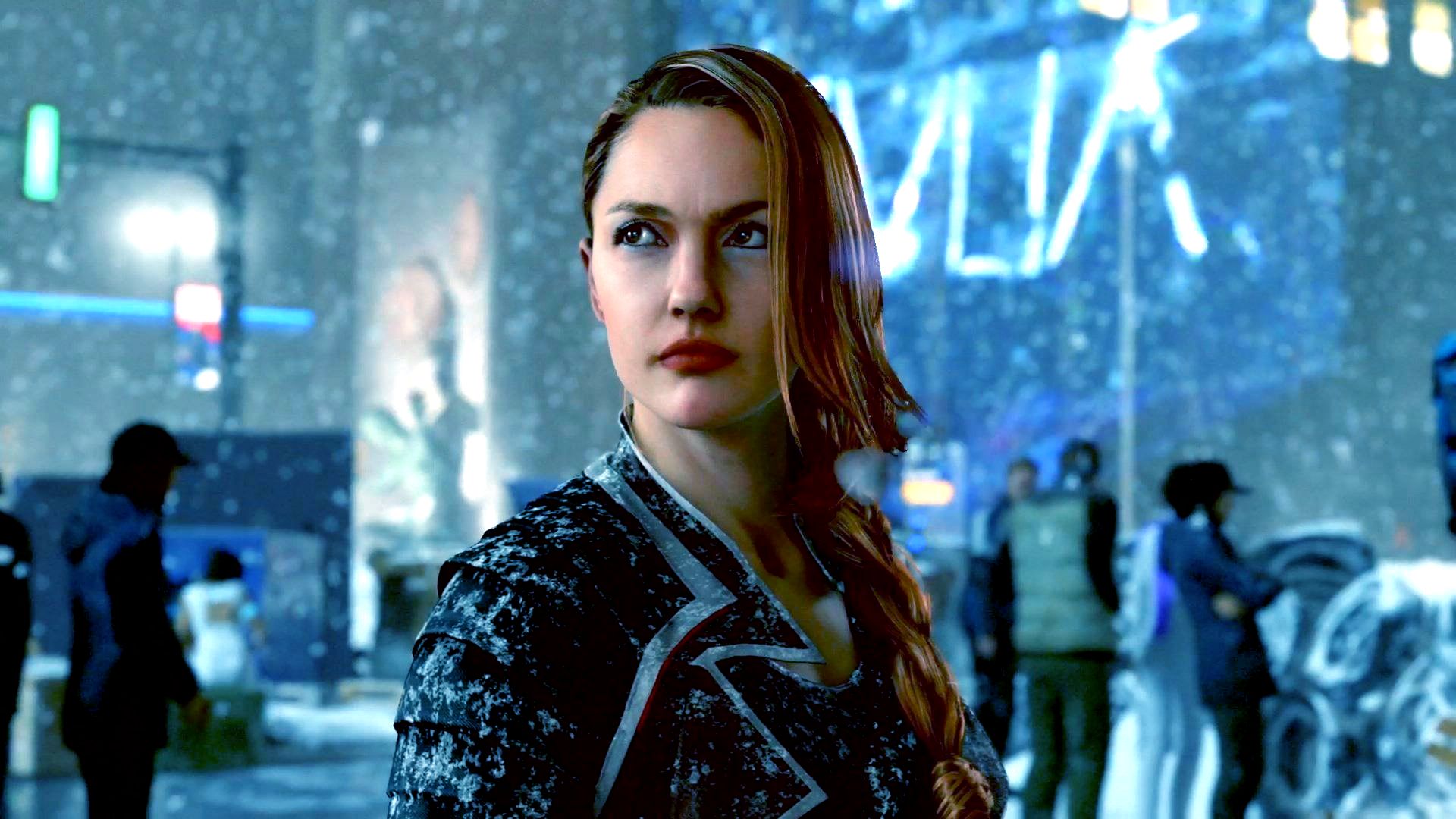
The third character is also an android, who is assigned to the appointed detective to investigate deviant behaviour in androids. Deviant being the codeword for showing signs of self awareness, of defiance. Their relationship is problematic to say the least. The appointed detective, Hank seems to give zero ducks about the case, or his job as a detective in it's entirety. And also seems to hate androids for some reason.
Of course the path of these characters will intersect during the story in classical Quantic Dream fashion. Well at least if they survive till the end. Which is up to the player.
That takes us right into the gameplay. What makes Detroit tick? Choices, choices, and more choices. Everything in the game is a choice. What object you examine, what do you say to NPCs, what solution you find to a given problem, how well you do on QTE encounters. All lead to specific story branches, that can have serious consequences, either immediately, or often much later in the story. Which is basically the same as Beyond, except there nobody really noticed it, because it was all seamless and unadvertised.
Well Quantic, has learned from that mistake, and now every branch in the story is represented in a tree structure that is shown to you after each chapter of the game. To drill it in: "Hey fool, look at all the things you didn't even notice" And I'm not being negative here, it is necessary, because players are often stoopid. Unfortunately it takes some of the immersion away, so I wished there was a game mode, where the story branches were not readily visible, or only shown after the whole story had played out.

The game even suggests that you should play it without altering anything retroactively on the first playtrough. But there is just too much temptation to go back sometimes. I did it once, too. Well, not once, actually. Multiple times, but to change just one thing, which bothered me very much. I had to try five, or six times before figuring out how to avoid the undesired outcome. Turns out it was triggered by something that I did a few chapters prior.
Which is a problem, because if you go back to change something multiple chapters ago, you have to replay every intermediate chapter again, even if those were completely unrelated and unaffected by your change, and you do everything the exact same way in them again. Further compounded by the fact that you cannot skip conversations or cutscenes, even on the nth try. This was especially annoying when I was trying different paths, after I already finished the game once.
About that, both in the case of Beyond and Heavy Rain, after it played out I had no interest in going back to events mid game to change something, I was glad they were over. In this game however, I've been trying different solutions for different outcomes for hours after finishing the game. That is a testament to this story being superior to both previous games, and me having much more vested interest in the fate of characters, not just playable characters. As your choices affect many NPCs as well.
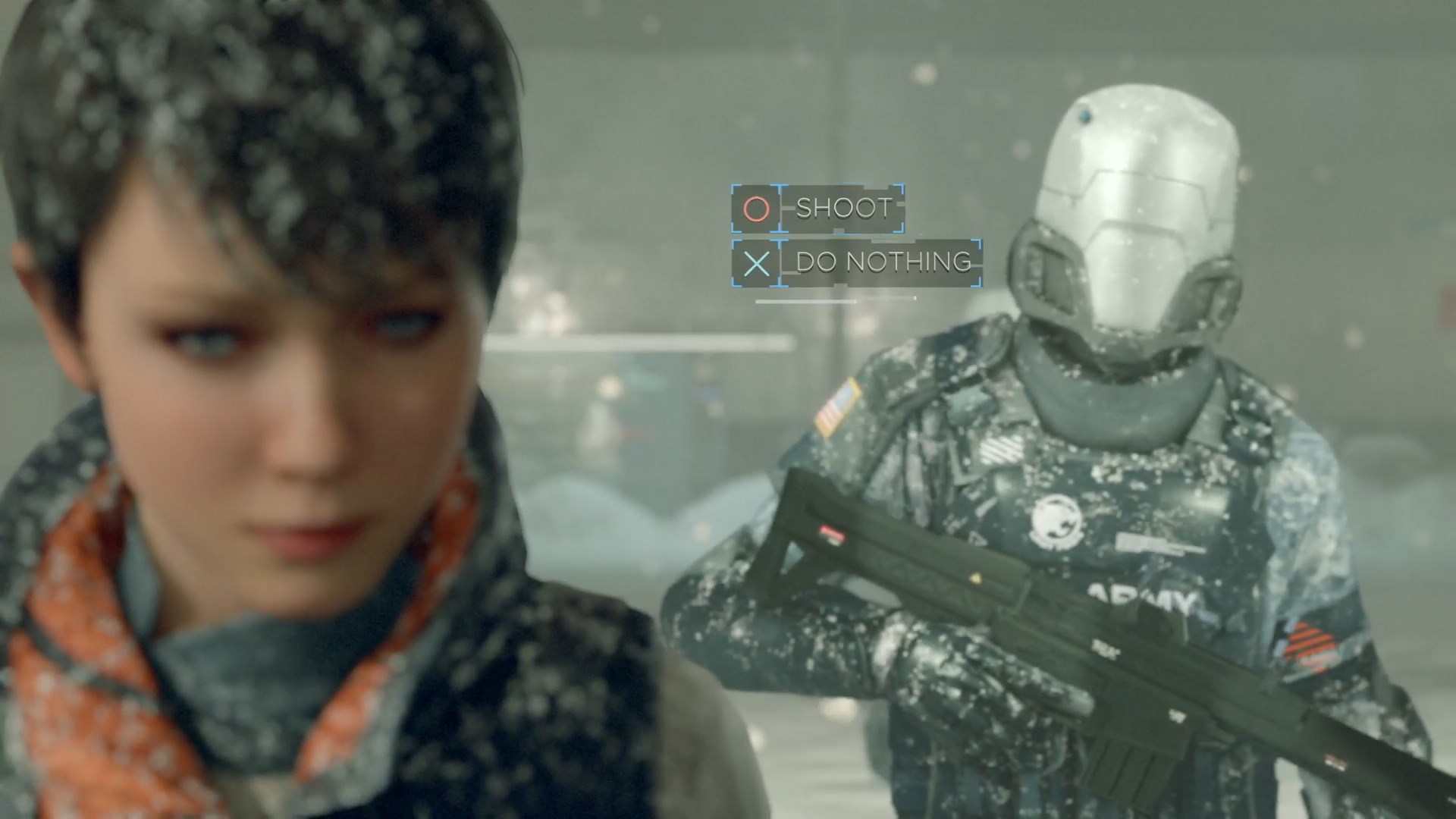
Let's talk graphics. The characters look really, really beautiful, Quantic has successfully crossed the uncanny valley. Sometimes it is really hard to tell, that you see characters rendered by the game engine and not real people. The animations are perfect, almost too perfect. I've been admiring some of the characters idle animations for minutes.
The online screenshots and videos really don't do justice to how good the people look in the game. The environments on the other hand are a curious mixed bag. Some look jaw dropping, almost photo-realistic. About 90% look OK, and a few look really bad, like they are remnants from some early PS3 game. Well I'm probably not far off from the truth there, as this game most likely started development for PS3.
There is only one question left to answer. Are they people? The game portrays almost all humans to be completely indifferent to androids. Which bugged me, because we all know that we can get emotionally attached even to basic household items. Or is it just me, who feels bad after breaking a plate or mug? So I think it is only natural that people would get even more attached to androids who look and act like people.
Let's see the yays and nays...
+
- Great story with countless branches
- Really makes you think
- Perfect animations
- Character models are immaculate
- Great replay value
- Multiple outcomes, or multiple routes to the same outcome
- The fate of almost all main characters is in your hands
- HDR + 4K
-
- Some environments look really bad
- No real freedom, your movement is almost always completely restricted
- The fate of almost all main characters depend upon your ability to do QTEs
- Conversation choices are not clear, the result of some choices are the opposite of what was expected
- I figured out the main twist in the story, almost at the start of the game. It was all too obvious in the first few chapters.
- It is always the twist that is responsible for the most glaring plotholes
- Some framedrops here and there, and it even crashed once on a PS4 Pro
- Pre-rendered cutscenes are HD only.
Scoring:
graphics/realization: 9/10
story/atmosphere: 10/10
gameplay/controls: 3/10
overall impression: 6/10
I said I'll be harsh. I feel the game deserved at least an 8, but no, I'm not tolerating this type of restrictive gameplay any longer.
If you liked their previous games, you won't be disappointed. But if you're new to them, and gameplay is important to you, then skip it. This game is about the narrative, nothing else.
